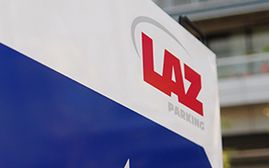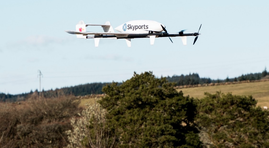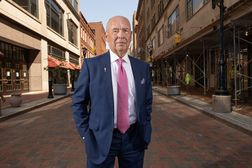
Processing Your Payment
Please do not leave this page until complete. This can take a few moments.
- News
-
Editions
View Digital Editions
Biweekly Issues
- May 13, 2024
- April 29, 2024
- April 15, 2024
- April 1, 2024
- March 18, 2024
- March 4, 2024
- February 19, 2024
- February 5, 2024
- January 22, 2024
- + More
Special Editions
- Lists
- Viewpoints
- HBJ Events
- Business Calendar
- Custom Content
Expanding Propark Mobility helps make Hartford a central hub to U.S. parking industry
 HBJ PHOTO | STEVE LASCHEVER
Propark CEO John Schmid at his parking company’s Union Station headquarters in downtown Hartford.
HBJ PHOTO | STEVE LASCHEVER
Propark CEO John Schmid at his parking company’s Union Station headquarters in downtown Hartford.
Hartford has been known as a dominant home to the insurance industry for decades, but quietly the city may be able to boast another title: parking capital of the U.S.
Two of the largest privately-owned parking operators in the country call Hartford home and both were founded by a small group of entrepreneurs who started their operations around the same time in the 1980s.
Alan Lazowski’s LAZ Parking typically captures most of the attention, but another parking operator — Propark Mobility — has become a major national player with 3,000 employees (including 200 in Hartford and 500 in Connecticut) and 600 locations in 17 states and 101 cities.
While the pandemic dealt a major blow to the parking industry in general, Propark was able to add 20 new locations and has ambitious plans to double in size over the next five years through acquisitions and competitive bidding on management contracts, said CEO John Schmid, who founded the company in 1984 with his wife Betsy Schmid and business partner Joe Coppola.
The pandemic shut down a number of Propark-operated lots and forced layoffs, but the company spent the last year stiffening its technology backbone and has now digitized nearly every aspect of its operations, which Schmid said will be key to the company’s future growth.
“We’ve digitized everything including our accounting systems,” Schmid said. “We are ready to go, we are built to scale, we can grow as quickly as [possible].”
Signs of expansion are evident in Hartford. Propark just won a significant public contract to operate seven downtown Hartford parking garages, including the Connecticut Convention Center and three other facilities in Adriaen’s Landing — the Morgan and Church street garages and soon-to-be-opened Bushnell South garage.
The company, which has $2 billion in assets under management, also just unveiled new and expanded office space in downtown Hartford at the former Hot Tomato’s restaurant location that adjoins Union Station, where Propark is headquartered. The company leased the space right before the pandemic and spent the last year turning it into a newly renovated shared office space for its employees in Hartford and across the country.
Early this month, many Propark employees who worked remotely throughout the pandemic were able to see the space for the first time — it includes a large conference room, separate shared work offices, each named after cities Propark does business in like Boston and San Francisco, a conference room called “Base Camp,” a cafeteria (which will eventually include a keg), recreation area with an indoor shuffleboard game, and outdoor dining space fronting Asylum Street and Union Place.
From ad agency to parking operator
Visuals are important to Schmid, and the new space reflects that.
It’s an industrial-chic motif with exposed piping along with visible steel beams that angle up to a high-up ceiling skylight. Glass-walled offices lining the space contain sleek, thin wood and steel desks, creating the kind of Brooklyn hip aura you might expect at a Millennial-run startup. A short walk from the office space, across from Union Station’s upper level train tracks, Propark employees can duck into a workout room designed to look like an old school Chicago boxing gym, complete with exposed brick dumbbells and a heavy bag.
Schmid, 63, started Propark almost by accident. Working as a Hartford stock broker in 1982, he griped about paying $120 per month to park in his office building’s garage, and asked the parking manager multiple times if there was any way around the fee.
“He finally said, ‘if you work one night a week, you get free parking during the day,’ “ Schmid said with a nostalgic grin. “So I did that, and I realized it’s a pretty fun job to have.”

But when he left his trading job and founded a new company with his wife and Coppola two years later, parking wasn’t really on his mind. They actually started an advertising agency.
Back then Hartford had a bustling, vibrant energy. The Hartford Whalers drew NHL fans to the city’s downtown Civic Center, where hot acts like Huey Lewis and the News played sold-out shows, and the New York Times noted in 1984 that the completion of the 38-story CityPlace office tower — then the tallest skyscraper between New York and Boston — capped off nearly 3 million square feet of office space added to Hartford’s downtown neighborhood in just two years.
Schmid and his partners created the “Best of Hartford” book, which highlighted the best companies in the city and offered discounts to them. It was a precursor to entertainment coupon books, Coppola said.
But even amid the 1980s era sky-is-the-limit exuberance in Connecticut’s Capital City, running a small advertising firm proved difficult, and chasing down clients with invoices wasn’t how any of the partners wanted to spend their time, Coppola said. Then a building owner Schmid knew through advertising work floated the idea of the ad company running a parking garage.
Just like that, they were in the parking business. And that first 60-space lot was across the street from Propark’s current headquarters.
The strange mix of knowledge Schmid gained from working as a parking attendant for a free space, and the group’s focus on advertising set them apart, Coppola said.
“[Parking] was a very stoic, black-and-white industry,” Coppola said. “Our marketing abilities and creativity gave us a leg up on proposals.”
For example, when bidding for a contract to handle parking at the former New Haven Coliseum, the group turned its proposal into a 3D mosaic of the facility. Propark won that contract.
“Marketing is a huge part of parking — both in getting clients, and in getting customers,” Coppola said. “It got us noticed and it had to help us get some gigs.”
Sustainability focus
That ad-minded approach guided Propark through a fortuitous period of expansion, during which the company started adding lots outside of Connecticut. In 2001, Propark opened a northern California lot in a former industrial area off Hegenberger Expressway near Oakland International Airport.

Dubbed “Expresso Airport Parking,” the lot was a pure marketing play, Schmid said. People flying out of Oakland International have other parking options, but Propark was able to regularly fill the 2,500-space lot on the strength of its branding and advertising work.
A few years after Expresso went online, the growing company set its sights on sustainability, building Canopy Airport Parking near Denver International Airport between 2007 and 2008. With that project, Propark set out to build the world’s greenest, most sustainable parking facility, Schmid said.
Canopy generates much of its own power via solar panels and on-site wind turbines, and uses geothermal energy for heating, and energy efficient LED bulbs to light the facility. It also includes a Schmid-led innovation: JuiceBar electric charging. Schmid developed the idea into a product with carmaker BMW, and featured the brand of parking lot EV chargers at Canopy Airport Parking when it opened. Propark later sold the majority of JuiceBar, which now has more than 1,400 charging stations across the country.
Propark’s push toward sustainability isn’t unique to the industry, said Rachel Yoka, vice president for program development at the International Parking & Mobility Institute, a parking industry trade organization of which Propark and LAZ Parking are members. But Schmid has significantly affected the industry’s sustainability standards through his work inside and outside of Propark, Yoka said.
In 2009, Schmid organized and launched the nonprofit Green Parking Council, an organization of some 30 companies -- including LAZ -- in the parking, green building and clean technology industries to develop strategies to increase energy efficiency in parking facilities.
By 2012 about 20,000 lots and garages were enrolled with the council, and two years later the organization set standards for Green Garage certification, which requires garages to incorporate sustainable technology like solar panels and EV charging. The U.S. Green Building Council now uses these standards for sustainable parking facilities in LEED certification.
“[Sustainability efforts in parking] have been building over time,” Yoka said. “As sustainability becomes more important to the driver, you’ll see more and more pressure in the market to be competitive in offering those features for sustainability.”
iPhone model command center
Propark’s focus on tech extends beyond sustainability efforts, though. In the last four years, Propark has invested in the seven figures digitizing the company, including creating state-of-the-art “command centers” from where employees can run parking facilities remotely.
On an early July day, Propark Chief Investment Officer — and John Schmid’s younger brother — David Schmid stood with Josh Crain, the company’s head of software engineering, in Propark’s main command center nestled within the ground floor of Hartford’s Union Station. The 1,200-square-foot space has the trappings of a NASA mission control center, with walls lined with monitors firing off real-time parking data and security camera footage from faraway parking facilities Propark runs.
“We took what we thought looked like the rotary phone model of a command center, and we turned it into this iPhone model of a command center,” David Schmid said.
Since 2015 Propark has moved all its remote command center operations to cloud servers via services like Google Cloud and Amazon Web Services, Crain said. That has allowed a team of about 70 software engineers on staff to develop a host of in-house apps, which Propark uses to automate between 30% and 40% of the facilities it operates across the country.
One artificial intelligence program analyzes the emotions of customers that call in with problems. It detects things like voice tone and decibel levels and keywords used in the call to determine whether the customer had a positive or negative experience, Crain said, pointing to blue and red dots flashing on a monitor in the command center.
“We can see the blue dots and the red dots indicating people’s emotions during the call in real time,” Crain said.
With this information, Propark can quickly alert facility managers to equipment malfunctions or other issues, Crain said. It also helps Propark learn parking patterns for different locations, and how many employees should be available to answer calls from customers at different times of day, David Schmid said.
“We get a report, so we know what locations, how many calls, time of day that it comes in,” David Schmid said. “We staff accordingly, too, because we know what’s going to happen.”
Employee ownership
While tech has become increasingly important to Propark, its executives see human capital as the real lynchpin for growth.
Like other parking companies, COVID-19 yanked the rug from underneath Propark’s regular operations, as facilities it operates shut down amid quarantine measures, forcing layoffs. The company did receive a $10 million loan from the federal Paycheck Protection Program to “keep as many people working as possible,” John Schmid said.
However, by the end of 2020 Propark had acquired 60 new parking locations — about double the rate of an average year.
The pandemic made smaller parking operators susceptible to acquisition, John Schmid said.
A few years ago the company also shifted to an employee shareholder model of ownership and started using that perk to aggressively recruit new senior-level employees, said Chief Operating Officer John Reimers.
“We went after a lot of people in the parking industry who were maybe not happy with their current organization,” said Reimers, who Propark poached from Towne Park in Denver in 2019.
The employee ownership model, which was approved by the IRS, took about a year to get off the ground and is different from an ESOP, David Schmid said. But it essentially distributes shares and gives an equity stake in the company to certain employees.
John Schmid said the move to employee ownership will help with succession planning when he eventually retires (he has no immediate plans to step away) and has been transformational to the company, boosting employee morale and productivity.
“I saw other parking companies sell, and the owners walk away and just left everybody. We don’t want to do that,” John Schmid said. “It totally changed the company.”
Employee ownership is proving to be a considerable draw, he said. Since Propark introduced the model, it has brought on about 15 partners who previously worked for competitors.
Reimers said talent recruitment and acquiring other parking companies are key elements to Propark’s plan to double in size in five years — the most aggressive growth goal in the company’s history.
“We’ve really seized the moment to go get that talent,” Reimers said. “It’s just like in [professional] sports — the best teams that are building these super teams.”
Even as it tries to expand into other markets, John Schmid said Hartford will remain Propark’s home. The company’s recent contract to run seven city-owned garages reflects his desire to help bring the city back to its 1980s-era glory days, he said.
“I think Hartford is heading in the right direction,” Schmid said. “That’s why we want to be part of it with the Convention Center.”
Related Content

2022 Giving Guide
This special edition informs and connects businesses with nonprofit organizations that are aligned with what they care about. Each nonprofit profile provides a crisp snapshot of the organization’s mission, goals, area of service, giving and volunteer opportunities and board leadership.
Learn more
Subscribe
Hartford Business Journal provides the top coverage of news, trends, data, politics and personalities of the area’s business community. Get the news and information you need from the award-winning writers at HBJ. Don’t miss out - subscribe today.
Subscribe
2024 Book of Lists
Delivering Vital Marketplace Content and Context to Senior Decision Makers Throughout Greater Hartford and the State ... All Year Long!
Read Here-
2022 Giving Guide
This special edition informs and connects businesses with nonprofit organizations that are aligned with what they care about. Each nonprofit profile provides a crisp snapshot of the organization’s mission, goals, area of service, giving and volunteer opportunities and board leadership.
-
Subscribe
Hartford Business Journal provides the top coverage of news, trends, data, politics and personalities of the area’s business community. Get the news and information you need from the award-winning writers at HBJ. Don’t miss out - subscribe today.
-
2024 Book of Lists
Delivering Vital Marketplace Content and Context to Senior Decision Makers Throughout Greater Hartford and the State ... All Year Long!
ABOUT
ADVERTISE
NEW ENGLAND BUSINESS MEDIA SITES
No articles left
Get access now
In order to use this feature, we need some information from you. You can also login or register for a free account.
By clicking submit you are agreeing to our cookie usage and Privacy Policy
Already have an account? Login
Already have an account? Login
Want to create an account? Register
Get access now
In order to use this feature, we need some information from you. You can also login or register for a free account.
By clicking submit you are agreeing to our cookie usage and Privacy Policy
Already have an account? Login
Already have an account? Login
Want to create an account? Register










0 Comments